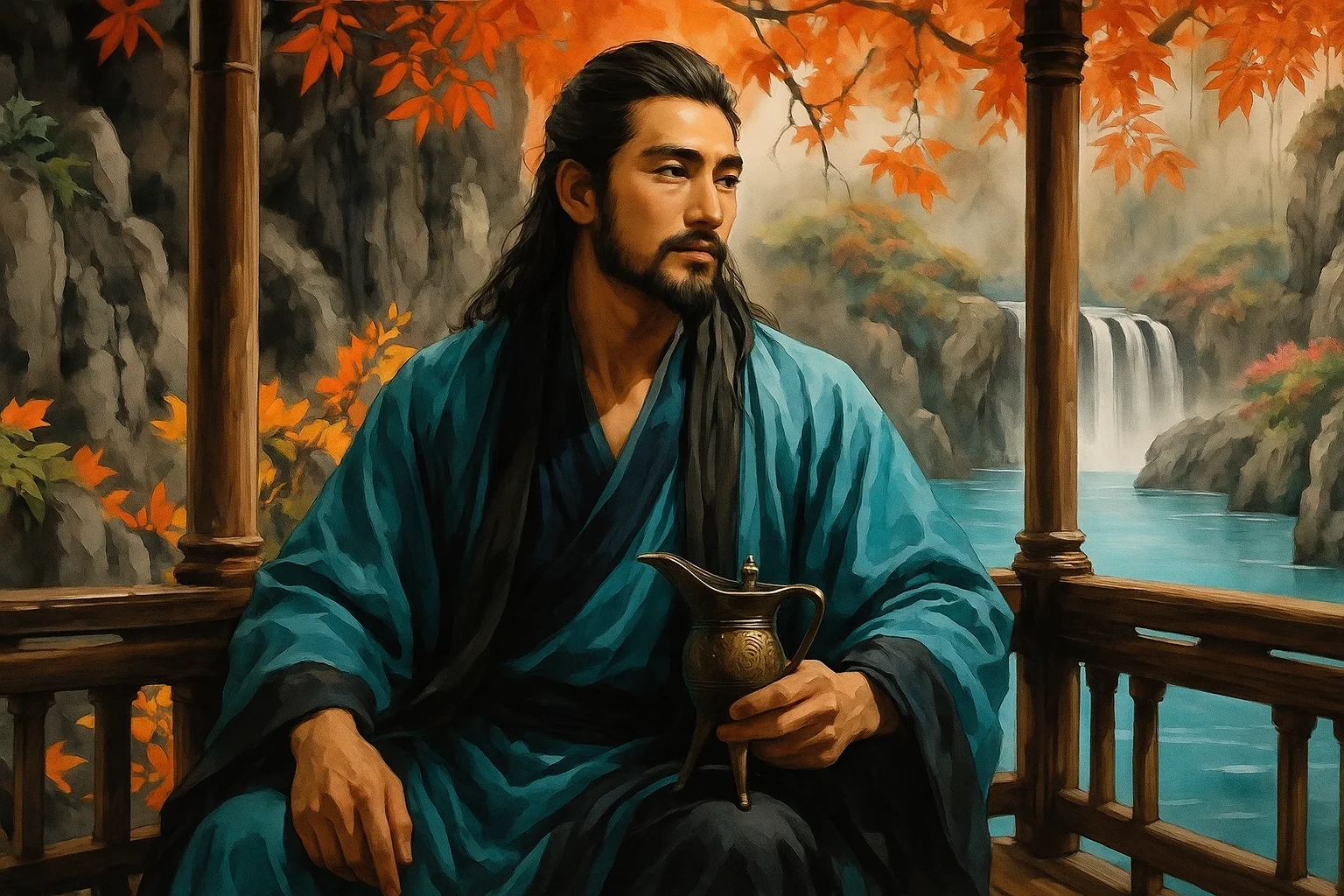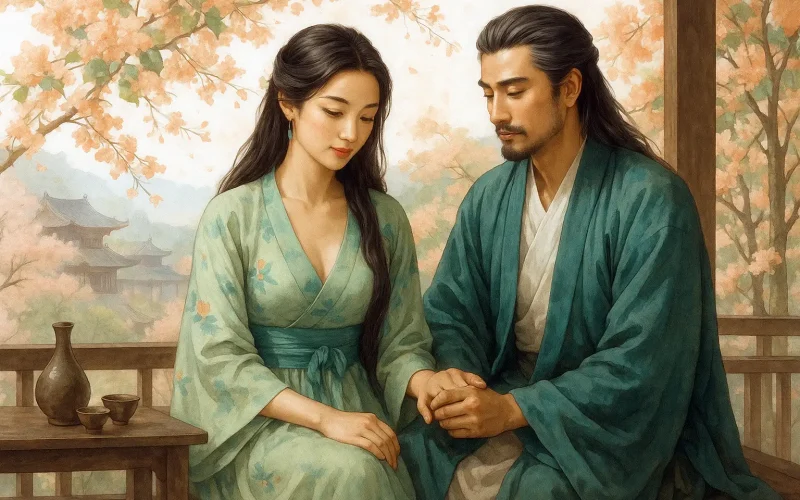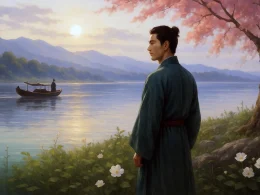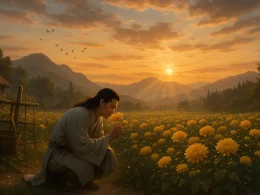Before the wine, I meant to speak of my return—
But my spring-radiant love, before a word,
Choked with sobs.
To be human is to know this folly of affection:
Such sorrow has little to do with moon or wind.
Oh, spare us another farewell song!
A single verse can knot the gut with grief.
No—we must see through all of Luoyang’s flowers,
Only then, with spring winds,
Take our leave lightly.
Original Poem
「玉楼春 · 尊前拟把归期说」
欧阳修
尊前拟把归期说,欲语春容先惨咽。
人生自是有情痴,此恨不关风与月。
离歌且莫翻新阕,一曲能教肠寸结。
直须看尽洛城花,始共春风容易别。
Interpretation
Composed in the spring of 1034 AD (the first year of Emperor Renzong's Jingyou era), this ci poem was written by Ouyang Xiu as his tenure as a judicial officer in the Western Capital (Luoyang) drew to a close. Though the specific recipient remains unnamed, the profound emotional depth suggests it was addressed to someone dearly beloved. With delicate artistry, the poem captures the poignant farewell moment while contemplating the philosophical tension between "love's obsession" and "life's impermanence," blending lyrical intensity with intellectual reflection to create deeply moving verse.
First Stanza: "尊前拟把归期说,欲语春容先惨咽。人生自是有情痴,此恨不关风与月。"
Zūn qián nǐ bǎ guī qī shuō, yù yǔ chūn róng xiān cǎn yè. Rén shēng zì shì yǒu qíng chī, cǐ hèn bù guān fēng yǔ yuè.
Before wine cups, I try to name my parting day—
Your springtime face contorts ere words take flight.
All mortals bear this love-madness as their plight,
No fault of moon or wind, but hearts that stray.
The opening depicts speech aborted by visible grief ("springtime face contorts"), where the beloved's physical reaction (惨咽) speaks louder than words. The sudden shift to philosophical assertion ("love-madness") universalizes the personal moment, suggesting emotional entanglement as intrinsic to human existence, independent of external catalysts (风月). This movement from concrete scene to abstract truth creates layered resonance.
Second Stanza: "离歌且莫翻新阕,一曲能教肠寸结。直须看尽洛城花,始共春风容易别。"
Lí gē qiě mò fān xīn què, yī qǔ néng jiào cháng cùn jié. Zhí xū kàn jìn luò chéng huā, shǐ gòng chūn fēng róng yì bié.
No new farewell songs—let old strains alone
Twist guts to knots with their familiar cry.
See every peony in Luoyang town,
Then part with spring wind, lighthearted, dry-eyed.
Rejecting "new farewell songs" (新阕) in favor of emotionally loaded familiar tunes, the speaker acknowledges music's visceral power to knot intestines (肠寸结). The resolution comes through sensory saturation—only by thoroughly consuming Luoyang's flowers (a metonym for shared memories) can one achieve the oxymoronic "lighthearted parting." This paradox between exhaustive experience and emotional detachment forms the poem's profound wisdom.
Holistic Appreciation
This lyric is a masterful expression of parting sorrow, blending profound emotion with philosophical reflection. The first stanza captures the unspoken weight of farewell, beginning with the beloved's sorrowful countenance before expanding into universal insights on human affection—demonstrating the poet's exceptional ability to "express emotion through reason." The second stanza intensifies in feeling, building toward the heart-wrenching climax of a farewell song, only to resolve with the resolute declaration to "see all of Luoyang's flowers in bloom." This reveals the poet's struggle to temper grief with the liberating spirit of appreciation—a testament to his resilient heart.
Two closing lines stand as timeless marvels: "By nature, human hearts are made for love’s despair— / This grief has nothing to do with moon or air" lays bare the essence of earthly devotion, while "Not till we’ve seen all flowers could we bear / To bid the spring wind a lighthearted farewell" transforms sorrow into a celebration of life’s fullness. Here, emotion deepens without drowning in melancholy, and reason enlightens without turning cold—making this work a quintessential example of Ouyang Xiu’s fusion of passion and wisdom, strength and tenderness.
Artistic Merits
- Reason Embodied in Emotion, Thought Infused with Feeling: The poet elevates personal parting into a meditation on love’s inevitable ache. Simple language carries profound resonance, enriching the lyric’s intellectual depth.
- Vivid Detail, Scene and Sentiment Intertwined: Lines like "spring’s beauty first choked with sobs" paint visceral imagery, conveying ineffable emotion through gesture and expression, grounding the poem in raw authenticity.
- Dynamic Emotional Arc, Tension and Release: The mood shifts from stifled grief ("a song knots the gut inch by inch") to the expansive resolve to "see all flowers," creating a cathartic spiral that mirrors the poet’s dual nature—both fiercely bold and exquisitely tender.
- Precision in Diction, Rigor in Rhythm: Compact yet potent phrases ("inch by knotted inch," "choked sobs," "see all") showcase linguistic mastery. Strict metrical form harbors vitality; solemnity coexists with lyrical grace.
Insights
This lyric lays bare the emotional paradox of human separation—the instinctive resistance to farewells and the inner turmoil they provoke. It teaches that true parting grief stems not merely from physical distance but from the heart’s unwillingness to let go. Such sorrow, as the poet notes, belongs neither to wind nor moon; it is simply the price of love. Every farewell leaves us with "a song knots the gut," yet genuine solace lies not in suppressing emotion but in embracing Ouyang Xiu’s antidote: to "see all of Luoyang’s flowers"—to live fully, to cherish fiercely, and to fortify memory against future absence.
In life, goodbyes are inevitable. Thus, we must heed the poet’s counsel: only after "seeing all flowers" can we "bid the spring wind a lighthearted farewell." Before separation arrives, we should immerse ourselves completely—to love deeply, to experience wholly. When grief runs deepest, transcendence may elude us, but within that pain, a transformation begins. To answer sorrow with exuberance, to meet loss with a spirit of celebration, is the profound emotional wisdom this lyric imparts.
About the Poet

Ouyang Xiu (欧阳修, 1007 - 1072), a native of Yongfeng, Jizhou (present-day Jiangxi Province), emerged as the preeminent literary figure of the Northern Song Dynasty. After attaining the jinshi degree in 1030, he spearheaded a literary reform movement that rejected the ornate Xikun style prevalent at court. As a mentor who nurtured literary giants like Su Shi and Zeng Gong, he laid the foundation for the golden age of Northern Song literature. Recognized as one of the "Eight Great Prose Masters of Tang and Song," Ouyang stands as the pivotal figure in the transformation of Northern Song literary culture.












